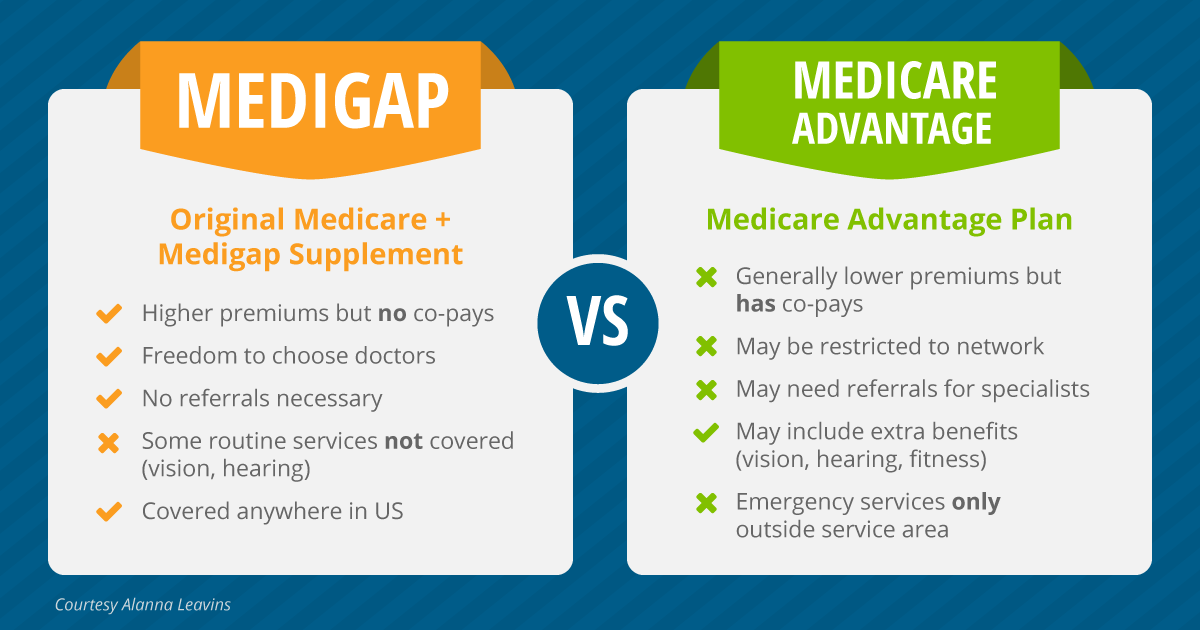What’s the difference between Medicare Advantage and Medicare Supplement? That’s an important question people hardly pause to ask themselves or the experts. As a matter of fact, most people often assume that it is right to use these two terms interchangeably, Medicare Advantage and Medicare Supplement.
As much as one can understand where they are coming from, that’s wrong and far from the truth. Yes, there are some similarities, especially regarding how the two names sound. Additionally, only private insurance companies offer them. Other than that, they are relatively different. So, how different are they? This article will highlight the difference between Medicare Advantage and Medicare Supplement using several criteria. They include;
- Meaning
- Eligibility
- Benefits
- Costs
- Enrollment
So, let’s delve into the difference between Medicare Advantage and Medicare Supplement.
Medicare Advantage vs Medicare Supplement: Meaning
As mentioned earlier, Medicare Advantage and Medicare Supplement are two different things. Let’s define the two to see the most basic difference between them.
What is Medicare Advantage?
Medicare Advantage is often called Medicare Part C. As far as the services covered are concerned, there is no difference between it and the regular Medicare health insurance policies. After all, its coverage includes medical, hospital, and prescription drugs. However, unlike Medicare health insurance offered by the federal government, it is the private insurance companies that offer Medicare Advantage. Other criteria are considered when offering the same but that will be discussed in the eligibility section.

What is Medicare Supplement?
Medicare Supplement is one of the health insurance policies out there. Only private insurance companies offer the policy, and as the name suggests, its role is to complement your existing Medicare policies. That explains why its synonym is Medigap. It covers the cost of services excluded in Parts A and B of Medicare insurance plans. Some of the Medicare Supplement covers services include deductibles, coinsurance, and co-pays.

Difference between Medicare Advantage and Medicare Supplement: Eligibility
What criteria do you need to meet to qualify for either Medicare Advantage or Medicare Supplement? Here are the answers.
Who is Eligible for Medicare Advantage?
For you to qualify for Medicare Advantage, these are the conditions that make you eligible
- If you have some health conditions such as an end-stage renal disease. That’s permanent kidney failure that needs transplant or dialysis
- They should also be residing in areas covered by the Medicare Advantage plan you choose
- You should be 65 years and above
- If below 65 years, you should be living with a disability
- Medicare part A and Part B enrolments are mandatory
Who is Eligible for Medicare Supplement?
These are the requirements that determine your eligibility for Medicare Supplement
- The beneficiary should be a national or citizen of the United States. Alternatively, they should be legal residents of the country
- Your age should be at least 65 years
- In some states, you can qualify for the plan when below 65 years if you are living with a disability
Medicare Advantage vs Medicare Supplement: Enrolment
There are periods set aside for the enrolment of these health insurance policies. They are as follows;
When to Enrol for Medicare Advantage
When it comes to enrolling for a Medicare Advantage plan, you have up to three options to choose from, including;
- Initial Medicare Enrollment Period three months to attaining 65 years or three months after the same
- Open Enrollment Period between 15th October and 7th December
- Medicare Advantage Open Enrollment Period between 1st January and 31st March every year
When to Enrol for Medicare Supplement
Most people become eligible for the Medicare Supplement plan at 65. Once you attain that age, it is important to note that you have 6 months to apply for a Medicare Supplement plan. Otherwise, you may have a hard time securing a plan or have to pay a huge price for the same.
Difference between Medicare Advantage and Medicare Supplement: Benefits
Let’s see what each plan covers.
What are the Benefits of Medicare Advantage?
Since it replaces the Original Medicare that covers Part A and B, the benefits you get are no different from those you received from the federal health insurance policy. In addition to that, you also benefit from routine dental and vision care. Most of these plans also cover Part D services prescription drugs.
What are the Benefits of Medicare Supplement?
On the other hand, Medicare Supplement works hand in hand with policies covering Part A and Part B services. Its role is to supplement it if it falls short. However, it is important to note that it can only supplement what your other Medicare insurance policy covers. The plan pays your coinsurance and deductible.
Medicare Advantage vs Medicare Supplement: Cost
How much will you pay to enjoy the benefits or these health insurance policies? Read on to find out!
What are the Costs of Medicare Advantage?
In most cases, people pay 0$ monthly premium to benefit from a Medicare Advantage Plan. However, you may pay a deductible ranging from 0$ to $500. Office visits will see you incur a co-payment of a figure ranging from $5 to $25. There is also an urgent care co-payment of $50. When it comes to in-patient services, a Medicare Advantage beneficiary will also pay $100 each day for the first 5 days. On average, they may also pay an out-of-pocket maximum of about $4,900. In some cases, the figure may go as high as $6,700.
What are the Costs of Medicare Supplement?
On the other hand, Medicare Supplement beneficiaries pay monthly premiums between $50 and $250. Other than that, they don’t pay an extra cost for the deductible, cost-sharing, or out-of-pocket maximum unless for plans K and L. Nevertheless, one may pay a Part B deductible of up to $198 in most cases.

A Summary of the Difference between Medicare Advantage and Medicare Supplement
The above discussion leaves no stone unturned regarding the difference between Medicare Advantage and Medicare Supplement. It defines the two terms to eliminate any confusion about the pair. It also highlights other differences, including cost, benefits, enrolment, and eligibility. Once you decide the best way forward, remember that FindMyQuotes can help you choose the best provider.











Recent Comments